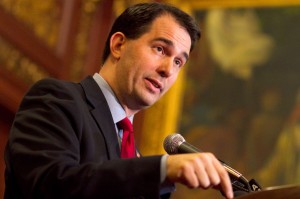The victory of Wisconsin's Republican Gov. Scott Walker, beating back a recall effort led by labor unions and liberal activists, underscores not only the Right's structural advantages in terms of money but the failure of the American Left over the past several decades to counter anti-government and anti-union propaganda.
Right-wing attacks -- demonizing Big Government and Big Labor -- have gone substantially uncontested by progressives who shut down or sold off much of their media in the 1970s (after the Vietnam War) and have resisted any serious effort to build a media infrastructure since then.
Meanwhile, the Right has invested billions upon billions of dollars over the past three decades in building a vertically integrated media machine that makes its case to Americans over a variety of platforms (cable TV, talk radio, well-funded Internet sites, newspapers, magazines and books). The Left simply has nothing to compare. Wealthy progressives have mostly sat on the sidelines.
This media imbalance -- including attack groups to go after the occasional mainstream journalist who does dare challenge the Right's propaganda -- has prevented average Americans, especially middle-class white men, from understanding the danger they face from unrestrained corporate power.
For instance, Wisconsin exit polls showed voters worrying about intrusive government and public-employee unions. A slight plurality favored the Tea Party and a majority supported Walker's efforts to deny state workers collective bargaining rights. Those attitudes were reflected in the Wisconsin outcome, with Walker besting Democrat Tom Barrett, 53 percent to 46 percent.
Yes, the flood of donations from right-wing billionaires -- buying up TV air time -- was important, but those messages resonated in large part because they reinforced the propaganda that Americans see and hear every day when they turn on their TVs or listen to their radios.
Americans are conditioned to the message that the "free market" is magical and will solve their problems if only Big Government and Big Labor are kept out of the way. The countervailing message that the greed of Big Business has become a destructive force, leading the United States and the world toward ruin, is a harder sell because it is rarely heard and thus dissonant.
Today, the Left's most important media voice is MSNBC, which is owned by Comcast and General Electric. Over the past several years, MSNBC has allowed a block of liberal programming in the evenings, but only after failing in earlier efforts to out-Fox Fox News in competition for the larger audience on the Right. That caused MSNBC to seek out the smaller but still profitable audience on the Left.
In other words, unlike Rupert Murdoch's Fox News, which is committed to a right-wing agenda, MSNBC is just tolerating liberal shows for their ratings, a calculation that could easily change if Comcast and General Electric sense that their other corporate interests are being put at risk. Remember, their other major cable TV property, CNBC, is dominated by correspondents shilling for rich investment bankers.
Hard Truth
Because of this national media imbalance, millions of Americans have failed to comprehend the hard truth of their economic situation: Even if there were no recession, corporations simply don't need as many of us as they used to. The combination of advanced technology and cheap labor abroad has made us expendable as workers (though paradoxically the corporations still want us as consumers).
The contradiction in that reality (that they don't want to pay us but they do want us to keep spending) is at the heart of America's economic crisis today.
The Great Recession has made matters worse, reinforcing the conviction among CEOs that their companies can make do with a lot fewer American workers. The recession also gave companies cover for culling their payrolls and announcing their determination to stay "lean" by relying on technology and shifting jobs overseas.
So, even as corporate profits recover, American workers shouldn't expect companies to hire up. And, the Republican prescription of slashing government payrolls to reduce taxes again mostly for the rich is only going to make the employment crisis worse. The private sector still won't hire up and there will be more workers competing for the few jobs that are out there.
The good news is that there is an obvious solution to this structural economic problem: The federal government could increase taxes on the rich, i.e., those who have been profiting off cheap foreign labor and advanced technology, and then recycle some of that money back to "expendable" workers via various jobs programs, from repairing the nation's infrastructure to improving the quality of life.
During some of America's biggest boom years in the Fifties and Sixties, the top marginal tax rate was 90 and 70 percent, respectively. Now, the top marginal rate is 35 percent on earned income and 15 percent on capital gains. That means, some rich investors are paying tax rates only one-sixth of the top rate under Dwight Eisenhower and less than one-quarter the top rate under John Kennedy.
(Note: You can view every article as one long page if you sign up as an Advocate Member, or higher).






